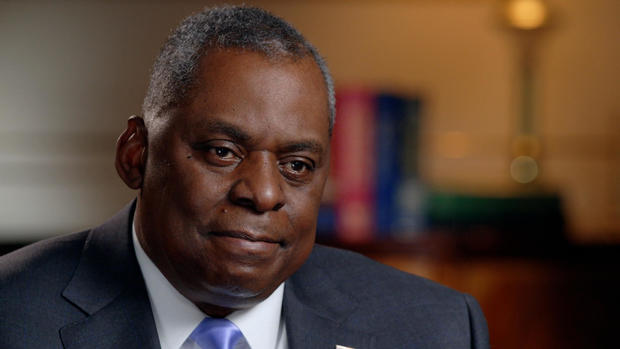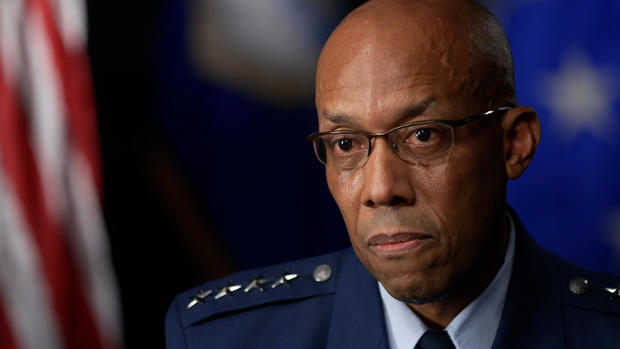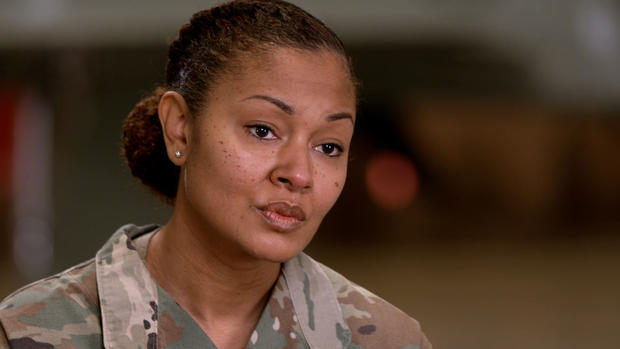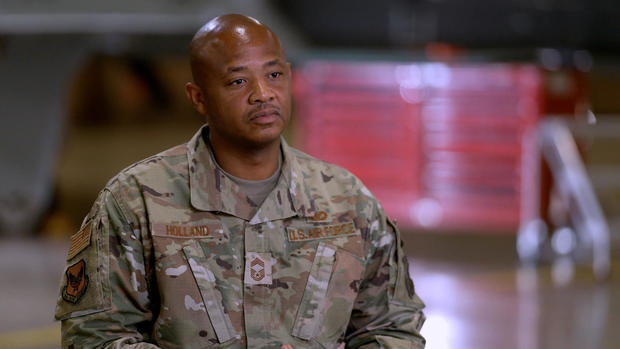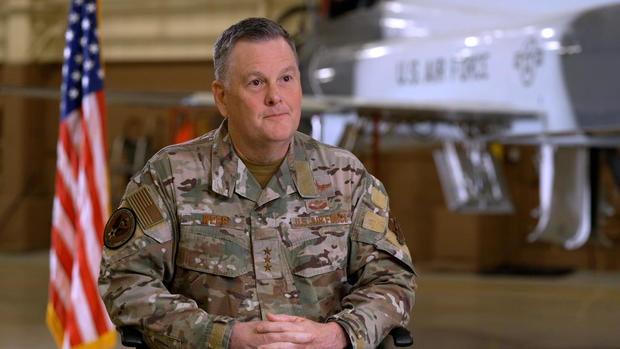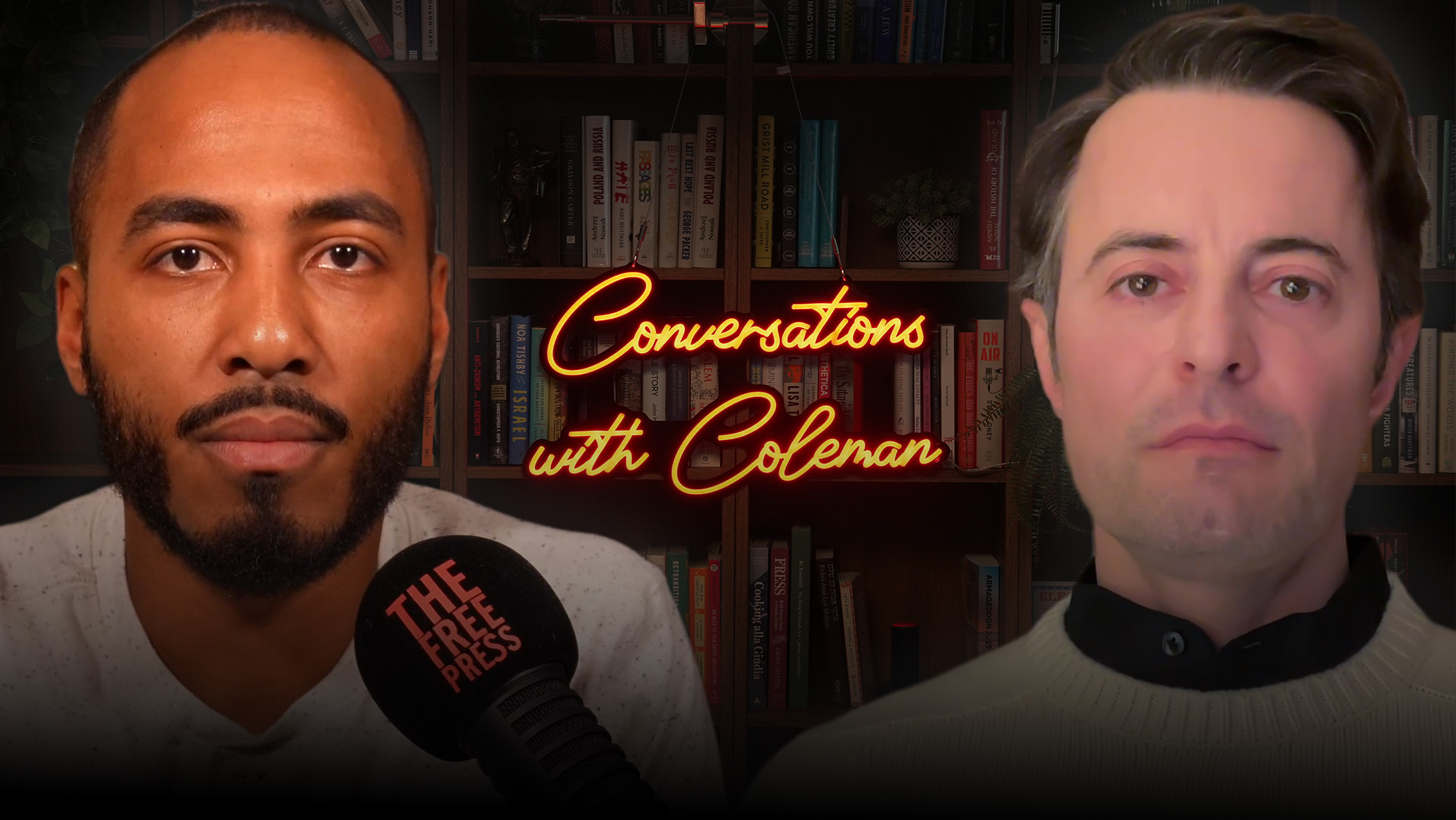Race in the Ranks: Investigating racial bias in the U.S. military
More than 70 years after the armed services were integrated, it is still a fact of life in the U.S. military that African Americans are more likely to be disciplined and less likely to be promoted than Whites. Even the most successful Black officers routinely feel the sting of racial bias while large segments of the rank and file believe the system is stacked against them. The military has made attempts to deal with inequality before but this time it's happening under the eye of Lloyd Austin, this country's first African American secretary of defense. A former soldier who experienced discrimination first-hand.
Secretary of Defense Lloyd Austin: It doesn't change-- as you climb the ladder. You still get the doubts. There are always gonna be people, because of what you look like, that will question your qualifications.
Lloyd Austin climbed every rung in the Army, starting at West Point - and rising all the way to four-star general - many times breaking barriers as the first African American ever to hold the job.
Secretary of Defense Lloyd Austin: There's probably not a job that I had since I was a lieutenant colonel where some people didn't question whether or not I was qualified to-- to take that job. It's a world I live in. And I'm sure that the other officers that you talked to would probably say the same thing. There's not a day in my life, David, when I didn't wake up and think about the fact that I was a Black man.
David Martin: A number of the African Americans that we have talked to-- for this story have said when they are the only one in the room, they feel as if they're not being listened to. Did you have that experience?
Secretary of Defense Lloyd Austin: Absolutely had that experience. And I found ways -- to operate, to adapt.
In 1995, as the 82nd Airborne's first African American operations officer, then Lieutenant Colonel Austin adapted by having someone else give his briefings – someone he felt White officers were more likely to listen to.
David Martin: Was that a White officer?
Secretary of Defense Lloyd Austin: It was.
David Martin: Did you feel that was a conscious bias, people not ready to listen to you?
Secretary of Defense Lloyd Austin: It absolutely was a conscious bias.
Bias didn't end even when he was a four-star general.
Secretary of Defense Lloyd Austin: I would go someplace with my staff, and we were wearing civilian clothes. Somebody would come out to meet the-- meet the general, and I wasn't the guy that they walked up to.
General C.Q. Brown: People have a perception that African Americans can't be in-- in key positions just because you're African American. They just assume that it's always gonna be somebody else.
General C.Q. Brown rose from fighter pilot to become the first African American in history to head the Air Force, which makes him a member of the Joint Chiefs of Staff. The last time there was an African American in this room was nearly 30 years ago when Colin Powell was chairman of the Joint Chiefs.
We met then-Lieutenant General Brown nearly six years ago at his operations center in the Persian Gulf where he was commanding the air war against ISIS.
It was all about destroying the enemy – but there was something else going on we didn't see.
General C.Q. Brown: There's a world that I live in as an African American and there's a world that I also live in as a minority inside the United States Air Force.
Those two worlds collided one day last May when a Minneapolis police officer pressed his knee into George Floyd's neck.
General C.Q. Brown: And the fact-- just the-- how long he was in the position he was in, and how nonchalant the cop looked-- and that-- that-- that actually-- I mean, that-- that bothered me tremendously.
Brown felt compelled to send out this message to his airmen.
General C.Q. Brown in video: Here's what I'm thinking about. I'm thinking about how full I am with emotion, not just for George Floyd but the many African Americans that have suffered the same fate as George Floyd.
With that, a lifetime of frustration came boiling out.
General C.Q. Brown in video: I'm thinking about the pressure I felt to perform error-free, especially for supervisors I perceived had expected less from me as an African American. I'm thinking about having to represent by working twice as hard to prove their expectations and perceptions of African Americans were invalid.
General C.Q. Brown: It-- was really what I wanted to get off my chest. I had no intention for it to-- go as big as it did-- but I'm glad it did, 'cause I think it helped-- generate the conversation that many of us are having-- today about race relations in the United States.
So far, the video has been viewed 4 million times
With Black Lives Matter protests breaking out across the country, the Air Force Inspector General conducted a survey on racial disparity which produced eye-opening responses.
"2 out of every 5 [African Americans] do not trust their chain of command to address racism, bias and unequal opportunities."
"3 out of every 5 five… believe they do not… receive the same benefit of the doubt as their White peers if they get in trouble."
There were 123,000 responses in just two weeks.
General C.Q. Brown: Really an outpouring of emotion from our airmen that I've not seen in the time I've been wearing this uniform.
For Senior Master Sergeant Sapphira Morgan, the survey was long overdue.
Senior Master Sergeant Sapphira Morgan: I think people were so just elated to finally have an opportunity to speak - when you hold in things for so long without being able to express yourself. And then you're given an avenue to speak. People ate it up.
The Air Force is now conducting another survey to include Hispanics and other minorities. But the hard data from the first survey is now a matter of record.
"…young Black enlisted members are almost twice as likely as White enlisted members to be involuntarily discharged based on misconduct."
Black airmen of all ranks are "…57% more likely…to face courts martial."
As a senior sergeant, Morgan had been seeing numbers like that for years.
Senior Master Sergeant Sapphira Morgan: I felt sick the first time I saw how many Black airmen had article 15s or discharges in comparison to White airmen. Across the Air Force. And the thing that I think hurt the most was that no one wanted to have the conversation.
Last summer that conversation began at Randolph Air Force Base in Texas with a program called "Real Talk," hosted by Lieutenant General Brad Webb.
Lieutenant General Brad Webb on "Real Talk": Obviously, the Air Force has fundamentally had a wake-up call.
In which Black airmen like Chief Master Sergeant Michael Holland got a chance to speak truth to air force power.
Chief Master Sergeant Michael Holland on "Real Talk": This is brave for us to address these things.
David Martin: You said to-- General Webb, "This is brave." What did you mean?
Chief Master Sergeant Michael Holland: It takes courage to talk about racism, you know, in America period, but really in the Air Force where it's-- White male dominated.
He told Webb, Black airmen have to abide by unwritten rules which don't apply to their White counterparts.
David Martin: What are some of the unwritten rules?
Chief Master Sergeant Michael Holland: Like, change your posture when you walk into the room.
David Martin: Change your posture?
Chief Master Sergeant Michael Holland: Yeah, so, I'm 5'11, right, 220 pounds. A Black big guy is scary and threatening. So you strip those things away from you to make people feel comfortable with you.
David Martin: What are some of the other things you have to strip?
Chief Master Sergeant Michael Holland: Voice, right. Voice, you don't wanna be loud.
David Martin: Any other unwritten rules?
Chief Master Sergeant Michael Holland: Yeah, you gotta be better.
For Lieutenant General Webb, the sessions were a revelation.
David Martin: Did you hear things that surprised you?
Lieutenant General Brad Webb: Oh yeah, I mean, any number of things.
David Martin: For example.
Lieutenant General Brad Webb: The African American community inside the Air Force is dealing with an extra load that the White Caucasian community does not deal with: Am I being intimidating by the way I talk? Am I being intimidating by the way I sit? There's a mental checklist that has to occur here that I was never oriented to ever in my Air Force career.
Episodes of "Real Talk" – including the one with Sergeant Sapphira Morgan - were streamed live on Facebook.
David Martin: It was up there for all to see, what was the reaction?
Senior Master Sergeant Sapphira Morgan: Negative and positive. I've had countless people say, "I never knew." But I've also had some Black people say, "Why are we exposing some of the things that we deal with to people who may not care?"
Chief Master Sergeant Michael Holland: Everybody's not for this. It's hard to accept, but that's you know, truth.
David Martin: The people who are not for this, what do they say?
Chief Master Sergeant Michael Holland: Nothing, right. And that's what makes it difficult. You know, you don't know what their biases are, right?
David Martin: Have you ever encountered a real racist--
Chief Master Sergeant Michael Holland: Oh yeah,
David Martin: --in the Air Force?
Chief Master Sergeant Michael Holland: Absolutely. Had a supervisor, you know, who told me I will never succeed under him. The best thing I could do is survive while he was there and to stay away from him.
David Martin: What'd you do?
Chief Master Sergeant Michael Holland: Stayed away from him.
The Facebook sessions were not Webb's first time in the hot seat. He was the busiest man in the White House Situation Room on the night of the Bin Laden raid.
After 37 years in the Air Force, he's now in charge of education and training.
David Martin: Before George Floyd and the events of last summer, how had the Air Force dealt with race?
Lieutenant General Brad Webb: We had training sessions, you know, that was principally PowerPoint slide oriented and it was very formalized.
David Martin: Did it have any impact on you?
Lieutenant General Brad Webb: Marginal, I mean, I have to be honest.
African Americans represent 17% of all the active duty troops in the military – but only 8% of the officers.
And in key jobs – like Air Force pilots - it's worse.
The top general, C.Q. Brown, knows that first-hand from his flying days in the 1990s.
David Martin: What was the-- percentage of Black pilots back then?
General C.Q. Brown: 2%.
David Martin: And what is it today?
General C.Q. Brown: It is still 2%.
David Martin: What does that say?
General C.Q. Brown: We haven't made much progress.
Retired Admiral Mike Mullen, chairman of the Joint Chiefs during the Bush and Obama administrations, set out to change the nearly all White complexion of the senior ranks.
David Martin: Was it racial bias?
Admiral Mike Mullen: I don't think it was conscious bias, but I think it was institutional bias, if you will.
David Martin: So, what is the institutional bias?
Admiral Mike Mullen: I have a phrase I use called ducks pick ducks. And when you have White guys pickin', they pick other White guys. That, to me, is the bias and that's what the leadership has to break up to make sure that we're not in that kind of a situation.
Mullen met then-Lieutenant General Lloyd Austin in Iraq and in 2009 brought him to Washington as the first African American director of the chairman's powerful Joint Staff.
Secretary of Defense Lloyd Austin: He said "You know, I really wanna diversify my staff." And he knew that talent was out there. But he knew that if he didn't lead the organization to-- to identify that talent and bring that talent on board, it wouldn't happen.
David Martin: There's that picture of you standing with the African-American generals and admirals on your-- your staff.
Admiral Mike Mullen: I mean, General Austin came into my office and said, "I want you to come down to the Joint Staff room for a minute. And I walked into that room and they were all standing there. And the photographer was ready to go. And I said, I asked them, I said, "What's this all about?" And one of them said, "It's about history."
Turns out it was only a moment in history. Eleven years later – these are the people who fill the top positions on the joint staff.
David Martin: Have you looked at the website of the-- Joint Staff lately?
Secretary of Defense Lloyd Austin: I have.
David Martin: Top 25, no African Americans.
Secretary of Defense Lloyd Austin: I suspect that'll change in the near term--
David Martin: It's been, what, more than 70 years since the Armed Forces were integrated. Why do you think it's-- it's taken this long?
Secretary of Defense Lloyd Austin: I think, things have moved slowly in America, David. I think, the military, in a lot of ways, has led the way for-- for diversity. But-- you know as well as I do that if you look at our senior leadership right now-- it's not representative of what's in the ranks.
David Martin: What in your job can you personally do to make a change?
Secretary of Defense Lloyd Austin: I'm the guy that makes the recommendation to the president on who our senior flag officers oughta be going forward.
Produced by Mary Walsh. Associate producer, Tadd J. Lascari. Broadcast associate, Mabel Kabani. Edited by Jorge J. García.

